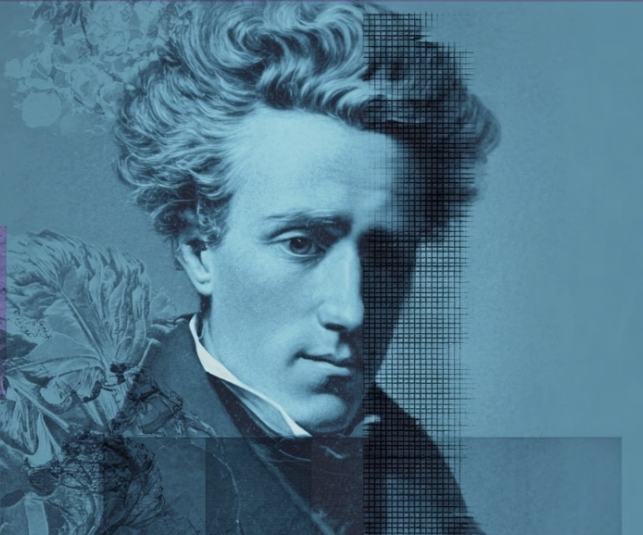
Danish philosopher, theologian, and father of existentialism
Life and Context
Søren Aabye Kierkegaard was born in Copenhagen, Denmark, into a wealthy but melancholic family. His father, Michael Pedersen Kierkegaard, was a deeply religious man who believed his family was cursed by God. This oppressive religious atmosphere profoundly shaped Søren's intellectual and spiritual development.
Kierkegaard studied theology and philosophy at the University of Copenhagen, where he became increasingly critical of the systematic philosophy of G.W.F. Hegel, which dominated European thought at the time. He also became disillusioned with the Danish State Church, which he saw as complacent and disconnected from authentic Christian faith.
His broken engagement to Regine Olsen in 1841 became a pivotal moment in his life, inspiring much of his later work on love, choice, and the nature of commitment. He never married and spent much of his life in relative isolation, dedicating himself to writing.
Philosophical Contributions
Kierkegaard is widely recognized as the father of existentialism, though he predated the formal movement by nearly a century. His philosophy centered on the individual's subjective experience and the importance of personal choice in creating meaning.
Key Philosophical Themes:
- Subjectivity and Truth: "Truth is subjectivity" — authentic truth is found in personal commitment and lived experience, not abstract systems
- The Three Stages of Existence: The aesthetic (pleasure-seeking), ethical (duty-bound), and religious (faith-centered) stages of life
- Anxiety and Despair: Fundamental conditions of human existence that reveal our freedom and need for meaning
- The Leap of Faith: Rational analysis cannot lead to religious faith; it requires a passionate, non-rational commitment
- The Individual vs. The Crowd: Authentic existence requires standing apart from mass society and conventional thinking
Major Works
- Either/Or (1843) — An exploration of aesthetic versus ethical life through contrasting perspectives
- Fear and Trembling (1843) — An examination of Abraham's sacrifice of Isaac and the nature of faith
- The Concept of Anxiety (1844) — Analysis of anxiety as the dizziness of freedom
- Philosophical Fragments (1844) — A critique of Hegelian philosophy and exploration of Christian paradox
- The Sickness Unto Death (1849) — A profound analysis of despair as a spiritual condition
- Practice in Christianity (1850) — A radical critique of institutional Christianity
Writing Style and Pseudonyms
Kierkegaard employed a unique literary strategy, publishing many works under various pseudonyms (such as Johannes Climacus, Anti-Climacus, and Victor Eremita). Each pseudonym represented a different perspective or stage of existence, allowing him to present ideas indirectly and force readers to engage actively with the text rather than passively accepting doctrine.
His writing combined philosophical rigor with literary artistry, using irony, paradox, and narrative to communicate ideas that he believed couldn't be captured by systematic philosophy alone.
Critique of Christendom
In his final years, Kierkegaard launched a fierce public attack on the Danish State Church and its bishop, Hans Martensen. He argued that institutional Christianity had become a comfortable, culturally acceptable religion that bore little resemblance to the radical, demanding faith of the New Testament. True Christianity, he insisted, required personal suffering, commitment, and the willingness to stand alone against society.
Death and Legacy
Kierkegaard died on November 11, 1855, at the age of 42, shortly after collapsing on a Copenhagen street. His funeral was marked by controversy when his nephew protested the State Church's involvement in the service.
During his lifetime, Kierkegaard was relatively unknown outside Denmark. However, his work was rediscovered in the early 20th century and profoundly influenced existentialist thinkers such as Martin Heidegger, Jean-Paul Sartre, Albert Camus, and Karl Jaspers. His ideas also impacted theology (Karl Barth, Paul Tillich), psychology (Rollo May), and literature (Franz Kafka, Walker Percy).
"Life can only be understood backwards; but it must be lived forwards."
— Søren Kierkegaard
Relevance Today
Kierkegaard's insights into anxiety, authenticity, faith, and individual choice remain powerfully relevant in contemporary culture. His critique of mass society and emphasis on personal responsibility speak to modern concerns about conformity, social media, and the search for meaning in a secular age. His work continues to challenge readers to examine their own existence and the choices that define their lives.
CivilSimian.com created by AxiomaticPanic, CivilSimian, Kalokagathia
